

Health & Safety | Shared Resources. Failing phytoplankton, failing oxygen: Global warming disaster could suffocate life on planet Earth. Falling oxygen levels caused by global warming could be a greater threat to the survival of life on planet Earth than flooding, according to researchers from the University of Leicester.
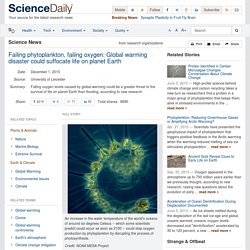
Soft drink tax war to bubble up in cities across the U.S. The American Turkey Farmer Takes On Mother Nature and Wins. Photo.
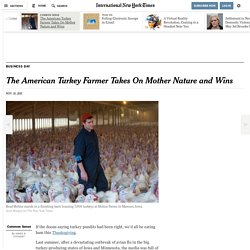
Atmospheric Greenhouse Gas Levels Hit Record, Report Says. Photo Global concentrations of carbon dioxide in Earth’s atmosphere surpassed 400 parts per million for a monthly average this past spring, breaching a symbolic barrier set by climate scientists and policy makers, according to a report released Monday.
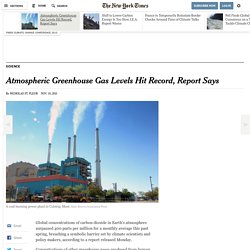
Concentrations of other greenhouse gases produced from human activities, such as methane and nitrous oxide, also reached records in 2014, the World Meteorological Organization announced in its annual Greenhouse Gas Bulletin. The report is one of several measurements made by different climate agencies to address the state of greenhouse gases in advance of the Paris Climate Summit. This California district brings tasty, local, affordable food to the cafeteria.
If you grew up eating school lunches, you probably think of them as gross: soggy vegetables, canned fruits, and mystery meats.
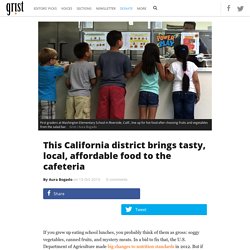
In a bid to fix that, the U.S. Department of Agriculture made big changes to nutrition standards in 2012. Why Food Waste is an Urgent Global Problem. You’ve probably already heard the stats: 35 million tons of food goes to the landfill every year in the United States.
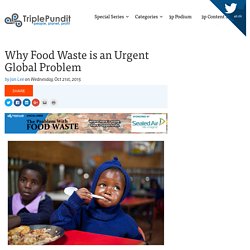
It’s a staggering amount when you figure that food comprised more than 20 percent of our entire yearly waste stream in 2013. Put another way: On average, every family in the nation loses $1,600 to $2,000 each year to food that is purchased but not eaten. That loss is more than what it costs to feed a family of four for an entire month.
For the business sector, that economic impact is even more staggering, says Mathy Stanislaus, assistant administrator to the Environmental Protection Agency’s Office of Solid Waste and Emergency Response. “The business sector throws away about $161 billion of food,” Stanislaus told TriplePundit. These losses pose a huge economic burden on our communities, but they also present significant social challenges. Arsenic found in many US red wines. A new University of Washington study that tested 65 wines from America’s top four wine-producing states — California, Washington, New York and Oregon — found all but one have arsenic levels that exceed what’s allowed in drinking water.
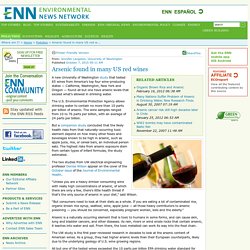
The U.S. Environmental Protection Agency allows drinking water to contain no more than 10 parts per billion of arsenic. The wine samples ranged from 10 to 76 parts per billion, with an average of 24 parts per billion. A Lot of People Think Sustainability Belongs in the Federal Nutrition Guidelines. Were you aware of the Dietary Guidelines Advisory Committee before this year?
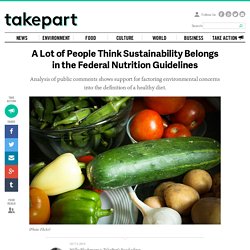
The group, composed of scientists and other public health experts, submits a report every five years that informs the government’s update of the federal nutrition standards. This tends to be big news for people who have a professional concern about what goes on nutrition labels, but this year, big changes in the report have made the rather wonky study a national news item, with lots of everyday people paying attention to it. In recent weeks, the focus has been the controversy caused by a piece published in the British Medical Journal that took issue—many say erroneously—with how the DGAC addressed fats and meat in its report.
These $1 Contraceptives Last Three Months—and Could Change the Lives of Millions. A Silent Scourge Is Wiping Out Crops in Africa. On a warm, sunny afternoon, Hawa Saidi Ibura stood outside her home in rural Tanzania and held out a basket of dark red beans to show why she could no longer get excited about a bountiful harvest.
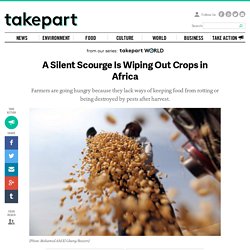
Will California redouble its push for clean energy? It all rides on this upcoming vote. It's difficult to overstate how important California is to the US clean energy effort.

For decades it has been serving as a kind of existence proof, growing its economy even as per-capita energy use and carbon intensity have fallen. (CA Senate) Every year, the market researchers at CleanEdge put out a Cleantech Leadership Index, ranking US cities and states on a range of more than 70 indicators, from renewable energy deployment to VC investment to clean energy patents to green buildings and more.
Here are the overall top 10 states from 2010 on: (CleanEdge) California is leading the nation on climate change and clean energy. Nation's water challenges are many, but so are the solutions. This Friday, Sept. 4, 2015 photo shows construction of the Carlsbad, Calif., desalination plant between Interstate 5 and the Pacific Ocean.
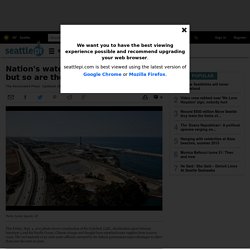
The Cost of a Crab Dinner: Dead Whales. Fishing gear is entangling whales at record rates along the West Coast of the United States, and now environmental groups are urging regulators to take action to keep the giant marine mammals safe. The number of whale entanglements reported for gray and humpback whales nearly doubled—from 16 incidents in 2013 to 31 last year—killing seven of the animals in 2014, according to data obtained from the National Marine Fisheries Service by environmental group the Center for Biological Diversity.
Twenty-five entanglements have been reported in just the first four months of 2015. The Eco-Friendly Approach to Cancer Sticks: Cigarette Recycling Comes to the U.K. With smoking increasingly banned in workplaces, bars, restaurants—and even inside tobacco companies themselves—in the developed world, it’s not too unusual to see someone standing outside, puffing on a cancer stick. But when that person is finished getting a nicotine fix, what does he or she do with the cigarette? A Sushi Master’s Lament—and the One Fish You Should Always Avoid. In times of drought, should I use hand sanitizer instead of washing my hands? Q. Chelan & Okanogan Complex Fires Fly Through 8-20-2015 @ 3:30AM. Vertical #farming coming soon to an #urban area near you with the promise #organic produce using 95% less water.
This facility will grow 22 crops per year with the help of LED lighting and a controlled environment. As documentaries like Food Inc. have conveyed, large-scale agricultural farming is not a sustainable method of producing food for the world’s growing population. Making a Living on the Bayou After a Decade of Disasters. SHELL BEACH, La. Farmers market vouchers may boost produce consumption in low-income families. Vouchers to buy fresh fruits and vegetables at farmers markets increase the amount of produce in the diets of some families on food assistance, according to research led by NYU's Steinhardt School of Culture, Education, and Human Development. The study, which appears online in Food Policy, suggests that farmers market vouchers can be useful tools in improving access to healthy food. This finding validates a new program created by the Agricultural Act of 2014, or farm bill, that incentivizes low-income families to buy produce at farmers markets.
Obama Administration Announces Actions to Protect Communities from the Health Impacts of Climate Change at White House Summit. President Obama is committed to combating the impacts of climate change and protecting the health of future generations. We know climate change is not a distant threat, we are already seeing impacts in communities across the country. Enduring Summer’s Deep Freeze. Microplastic Particles Move Up Marine Food Chain on B.C. Coast. Plastic fibres and particles in West Coast waters are being consumed and passed up the food chain by tiny marine creatures that apparently mistake them for food, according to a new study from the Vancouver Aquarium Marine Science Centre. Feeling Down? Take a Walk in the Woods. Zero Counties in the U.S. Have Enough Housing for Families in Extreme Poverty.
From Portland, Oregon, to Portland, Maine. How to Stop Humans From Filling the World With Trash. This County In Oregon Completely Banned GMO Crops. Here's Why That Matters For The Environment. Climate Change Is Helping One Weird Pest Destroy More Crops. Your Fresh Fish Dinner Now Comes with a Dose of Prescription Drugs. This New San Francisco Corner Market Design Will Make You Crave Vegetables. Across U.S., Heaviest Downpours On The Rise. Portland Now Generates Electricity From Turbines Installed In City Water Pipes. We're Pumping So Much Groundwater That It's Causing the Oceans to Rise. It Takes How Much Water to Grow an Almond?! Want to Reduce Your Carbon Footprint? Eat Less Beef. These 6 Countries Are Responsible For 60% Of CO2 Emissions. The Invasion of the K-Cup and its ‘monster’ environmental problem. Using Solar Energy to Improve Desalination Process. Organic Food Reduces Pesticide Exposure. A Green Light for Using Rain Barrel Water on Garden Edibles.
Stormwater Solutions: Curbing Toxic Runoff. Procter & Gamble Releases 16th Annual Sustainability Report. The Surprising Source of Pollution Trashing San Diego’s Beaches. Argentina: The Country that Monsanto Poisoned. Saving Our Soils and Climate with Biochar. These Floating Sea Trees Could Bring Wildlife Back to Big Cities. Seeking Creative Ways to Deal with Food Waste at Hospitals. Will a Global Roundtable for Sustainable Beef Matter? Fracking the Poor. Combatting Illegal Fishing in Offshore Marine Reserves. Making A Global Action Plan For Antibiotics. Electronic 'tongue' to Ensure Food Quality. Thirdhand Smoke: Toxic Airborne Pollutants Linger Long After Smoke Clears. More Than One-Third of U.S. Shrimp May Be Mislabeled, Study Says. Five Data Tools Used to Improve Water and Food Security. Food Waste is a Bigger Problem Than You Think.